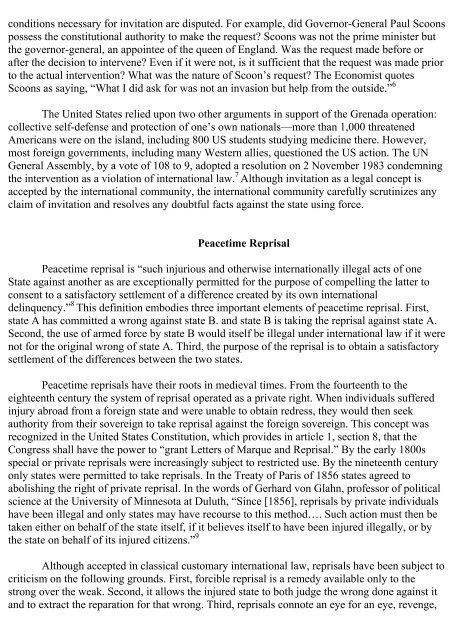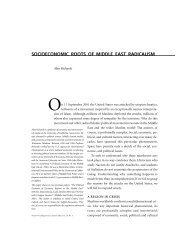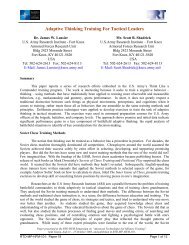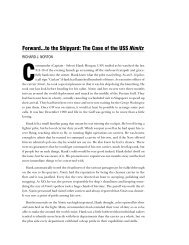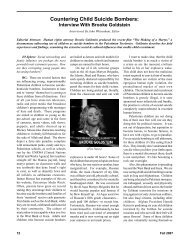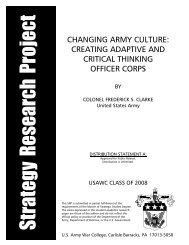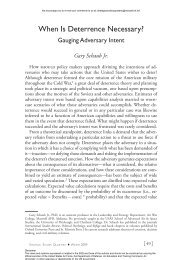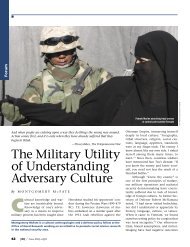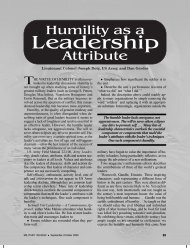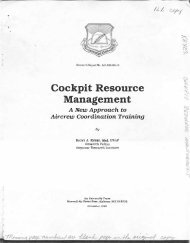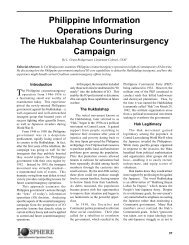Legitimate use of military force against state-sponsored - Air University
Legitimate use of military force against state-sponsored - Air University
Legitimate use of military force against state-sponsored - Air University
Create successful ePaper yourself
Turn your PDF publications into a flip-book with our unique Google optimized e-Paper software.
conditions necessary for invitation are disputed. For example, did Governor-General Paul Scoons<br />
possess the constitutional authority to make the request? Scoons was not the prime minister but<br />
the governor-general, an appointee <strong>of</strong> the queen <strong>of</strong> England. Was the request made before or<br />
after the decision to intervene? Even if it were not, is it sufficient that the request was made prior<br />
to the actual intervention? What was the nature <strong>of</strong> Scoon’s request? The Economist quotes<br />
Scoons as saying, “What I did ask for was not an invasion but help from the outside.” 6<br />
The United States relied upon two other arguments in support <strong>of</strong> the Grenada operation:<br />
collective self-defense and protection <strong>of</strong> one’s own nationals—more than 1,000 threatened<br />
Americans were on the island, including 800 US students studying medicine there. However,<br />
most foreign governments, including many Western allies, questioned the US action. The UN<br />
General Assembly, by a vote <strong>of</strong> 108 to 9, adopted a resolution on 2 November 1983 condemning<br />
the intervention as a violation <strong>of</strong> international law. 7 Although invitation as a legal concept is<br />
accepted by the international community, the international community carefully scrutinizes any<br />
claim <strong>of</strong> invitation and resolves any doubtful facts <strong>against</strong> the <strong>state</strong> using <strong>force</strong>.<br />
Peacetime Reprisal<br />
Peacetime reprisal is “such injurious and otherwise internationally illegal acts <strong>of</strong> one<br />
State <strong>against</strong> another as are exceptionally permitted for the purpose <strong>of</strong> compelling the latter to<br />
consent to a satisfactory settlement <strong>of</strong> a difference created by its own international<br />
delinquency.” 8 This definition embodies three important elements <strong>of</strong> peacetime reprisal. First,<br />
<strong>state</strong> A has committed a wrong <strong>against</strong> <strong>state</strong> B. and <strong>state</strong> B is taking the reprisal <strong>against</strong> <strong>state</strong> A.<br />
Second, the <strong>use</strong> <strong>of</strong> armed <strong>force</strong> by <strong>state</strong> B would itself be illegal under international law if it were<br />
not for the original wrong <strong>of</strong> <strong>state</strong> A. Third, the purpose <strong>of</strong> the reprisal is to obtain a satisfactory<br />
settlement <strong>of</strong> the differences between the two <strong>state</strong>s.<br />
Peacetime reprisals have their roots in medieval times. From the fourteenth to the<br />
eighteenth century the system <strong>of</strong> reprisal operated as a private right. When individuals suffered<br />
injury abroad from a foreign <strong>state</strong> and were unable to obtain redress, they would then seek<br />
authority from their sovereign to take reprisal <strong>against</strong> the foreign sovereign. This concept was<br />
recognized in the United States Constitution, which provides in article 1, section 8, that the<br />
Congress shall have the power to “grant Letters <strong>of</strong> Marque and Reprisal.” By the early 1800s<br />
special or private reprisals were increasingly subject to restricted <strong>use</strong>. By the nineteenth century<br />
only <strong>state</strong>s were permitted to take reprisals. In the Treaty <strong>of</strong> Paris <strong>of</strong> 1856 <strong>state</strong>s agreed to<br />
abolishing the right <strong>of</strong> private reprisal. In the words <strong>of</strong> Gerhard von Glahn, pr<strong>of</strong>essor <strong>of</strong> political<br />
science at the <strong>University</strong> <strong>of</strong> Minnesota at Duluth, “Since [1856], reprisals by private individuals<br />
have been illegal and only <strong>state</strong>s may have recourse to this method…. Such action must then be<br />
taken either on behalf <strong>of</strong> the <strong>state</strong> itself, if it believes itself to have been injured illegally, or by<br />
the <strong>state</strong> on behalf <strong>of</strong> its injured citizens.” 9<br />
Although accepted in classical customary international law, reprisals have been subject to<br />
criticism on the following grounds. First, forcible reprisal is a remedy available only to the<br />
strong over the weak. Second, it allows the injured <strong>state</strong> to both judge the wrong done <strong>against</strong> it<br />
and to extract the reparation for that wrong. Third, reprisals connote an eye for an eye, revenge,


